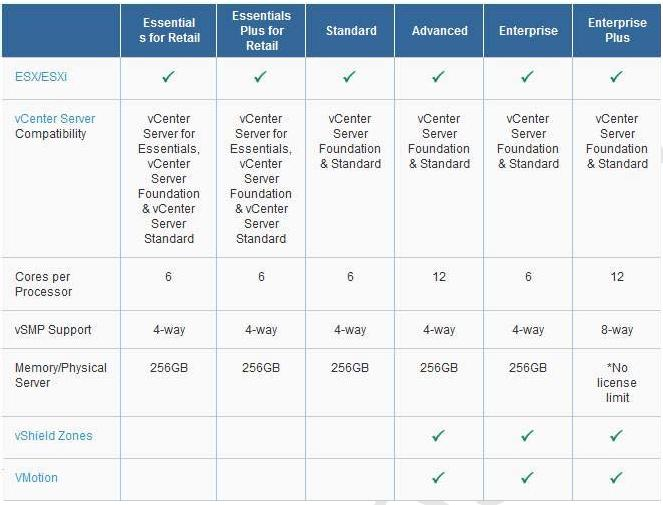A company plans to implement an ESX 4.0 / vCenter infrastructure that includes the
following:
-three ESX Server host machines with four physical dual-core processors
-the ability to migrate running virtual machines (VMs) between these hosts without
taking them offline
-multiple processor support for certain applications
What licensing is necessary to support these requirements?

A.
1 vCenter server license, a 24-processor VMotion license, and a 24-processor ESX
Server license
B.
1 vCenter server license, a 12-processor VMotion license, and a 12-processor ESX
Server license
C.
3 vCenter server licenses, 3 VMotion licenses, and 3 ESX Server licenses
D.
1 vCenter server license, 1 VMotion license, and an ESX Server license for each
virtual processor for each running VM
Explanation:
VMware vSphere 4 Compare vSphere Editions for Mid-size and Enterprise Businesses.VMware Multi-Core Pricing & Licensing Policy
How does this policy affect my licensing costs on servers with less than 6 cores per
processor?When upgrading your hardware to multi-core technology, you do not need to pay
additional licensing fees for a processor with up to 6-cores per processor. For example, if
you purchase a two-socket server with each socket populated with a 6-core processor,
you need to purchase only two processor licenses of VMware vSphere or related products
for that server.How does this policy affect my licensing costs on servers with 8-cores per processor?
When upgrading your hardware to a server with 8-cores per processor you may upgrade
your license or purchase a new license for VMware vSphere Advanced or Enterprise Plus
that allows you to deploy the applicable software on up to 12-cores per processor1. Three ESX Server host machines with four physical dual-core processors will therefore require 3 x 4 = 12 licenses
2. The ability to migrate running virtual machines (VMs) between these hosts without
taking them offline requires VMotion, which is licensed as above, sop would require 12
licenses of an appropriate version of vSphere.3. Multi-processor support for applications is based on physical processor availability,
and is not sperately licensed4. Each vCenter installation is separately licensed. Since this is a very small site, and
there is no indication that additional vCenter servers will be installed, a single license is
required for vCenter server.



Correct answer is
0
0